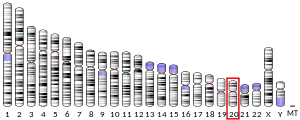AP5S1
AP-5 complex subunit sigma (AP5S1) is a protein that in humans is encoded by the AP5S1 gene.[5]
| AP5S1 | |||||||||||||||||||||||||||||||||||||||||||||||||||
|---|---|---|---|---|---|---|---|---|---|---|---|---|---|---|---|---|---|---|---|---|---|---|---|---|---|---|---|---|---|---|---|---|---|---|---|---|---|---|---|---|---|---|---|---|---|---|---|---|---|---|---|
| Identifiers | |||||||||||||||||||||||||||||||||||||||||||||||||||
| Aliases | AP5S1, C20orf29, adaptor related protein complex 5 sigma 1 subunit, adaptor related protein complex 5 subunit sigma 1 | ||||||||||||||||||||||||||||||||||||||||||||||||||
| External IDs | OMIM: 614824 MGI: 1916846 HomoloGene: 23095 GeneCards: AP5S1 | ||||||||||||||||||||||||||||||||||||||||||||||||||
| |||||||||||||||||||||||||||||||||||||||||||||||||||
| |||||||||||||||||||||||||||||||||||||||||||||||||||
| |||||||||||||||||||||||||||||||||||||||||||||||||||
| |||||||||||||||||||||||||||||||||||||||||||||||||||
| |||||||||||||||||||||||||||||||||||||||||||||||||||
| Wikidata | |||||||||||||||||||||||||||||||||||||||||||||||||||
| |||||||||||||||||||||||||||||||||||||||||||||||||||
Function
The protein encoded by this gene is the small subunit of the AP5 adaptor complex.[6] Variants in this gene have not been implicated in any disease but damaging variants in AP5Z1, the gene encoding one of the large subunits in this complex, are associated with SPG48, a type of hereditary spastic paraplegia.[7][8] In addition, damaging variants in the genes encoding two proteins that stably associate with the AP-5 adaptor complex are also associated with forms of hereditary spastic paraplegia - SPG11 with the disease of the same name[9] and ZFYVE26 with SPG15.[10]
References
- GRCh38: Ensembl release 89: ENSG00000125843 - Ensembl, May 2017
- GRCm38: Ensembl release 89: ENSMUSG00000068264 - Ensembl, May 2017
- "Human PubMed Reference:". National Center for Biotechnology Information, U.S. National Library of Medicine.
- "Mouse PubMed Reference:". National Center for Biotechnology Information, U.S. National Library of Medicine.
- Hirst, Jennifer; Barlow, Lael D.; Francisco, Gabriel Casey; Sahlender, Daniela A.; Seaman, Matthew N. J.; Dacks, Joel B.; Robinson, Margaret S. (2011-10-11). "The fifth adaptor protein complex". PLOS Biology. 9 (10): e1001170. doi:10.1371/journal.pbio.1001170. ISSN 1545-7885. PMC 3191125. PMID 22022230.
- Hirst, Jennifer; Irving, Carol; Borner, Georg H. H. (2012-11-21). "Adaptor protein complexes AP-4 and AP-5: new players in endosomal trafficking and progressive spastic paraplegia". Traffic. 14 (2): 153–164. doi:10.1111/tra.12028. ISSN 1600-0854. PMID 23167973. S2CID 13766991. Archived from the original on 2022-02-10. Retrieved 2022-07-09.
- Słabicki, Mikołaj; Theis, Mirko; Krastev, Dragomir B.; Samsonov, Sergey; Mundwiller, Emeline; Junqueira, Magno; Paszkowski-Rogacz, Maciej; Teyra, Joan; Heninger, Anne-Kristin; Poser, Ina; Prieur, Fabienne (2010-06-29). "A genome-scale DNA repair RNAi screen identifies SPG48 as a novel gene associated with hereditary spastic paraplegia". PLOS Biology. 8 (6): e1000408. doi:10.1371/journal.pbio.1000408. ISSN 1545-7885. PMC 2893954. PMID 20613862.
- Hirst, Jennifer; Madeo, Marianna; Smets, Katrien; Edgar, James R.; Schols, Ludger; Li, Jun; Yarrow, Anna; Deconinck, Tine; Baets, Jonathan; Van Aken, Elisabeth; De Bleecker, Jan (2016-08-25). "Complicated spastic paraplegia in patients with AP5Z1 mutations (SPG48)". Neurology. Genetics. 2 (5): e98. doi:10.1212/NXG.0000000000000098. ISSN 2376-7839. PMC 5001803. PMID 27606357.
- Stevanin, Giovanni (1993), Adam, Margaret P.; Mirzaa, Ghayda M.; Pagon, Roberta A.; Wallace, Stephanie E. (eds.), "Spastic Paraplegia 11", GeneReviews®, Seattle (WA): University of Washington, Seattle, PMID 20301389, archived from the original on 2022-01-22, retrieved 2022-07-09
- Hanein, Sylvain; Martin, Elodie; Boukhris, Amir; Byrne, Paula; Goizet, Cyril; Hamri, Abdelmadjid; Benomar, Ali; Lossos, Alexander; Denora, Paola; Fernandez, José; Elleuch, Nizar (April 2008). "Identification of the SPG15 gene, encoding spastizin, as a frequent cause of complicated autosomal-recessive spastic paraplegia, including Kjellin syndrome". American Journal of Human Genetics. 82 (4): 992–1002. doi:10.1016/j.ajhg.2008.03.004. ISSN 1537-6605. PMC 2427184. PMID 18394578.
This article is issued from Wikipedia. The text is licensed under Creative Commons - Attribution - Sharealike. Additional terms may apply for the media files.



